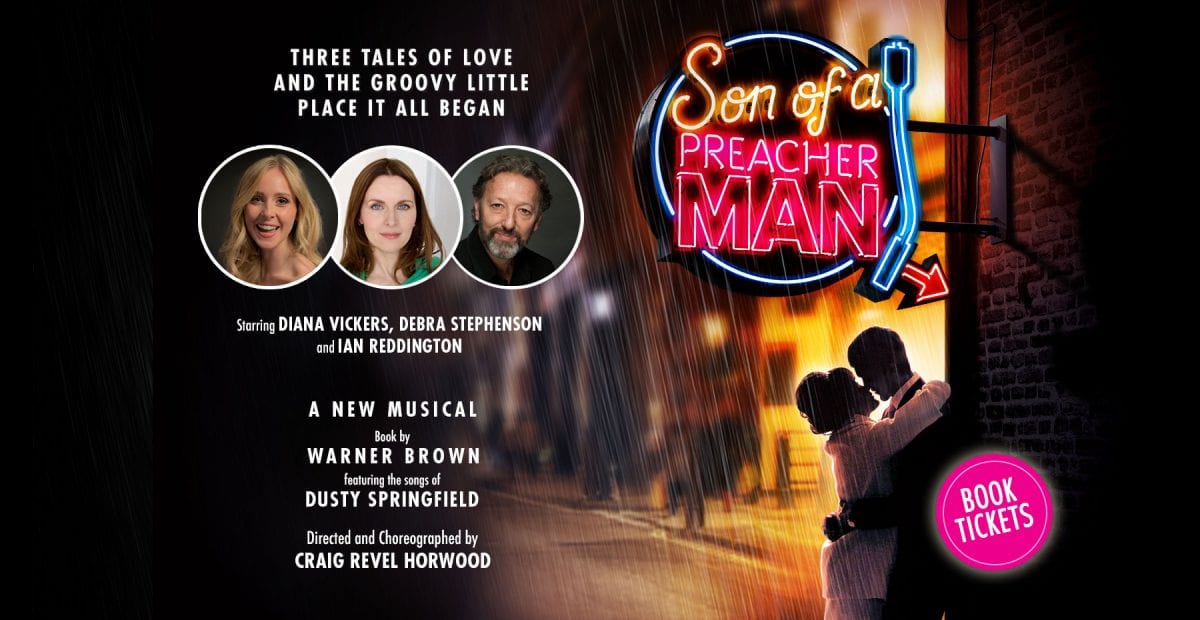Son of a Preacher Man is a new “compilation” musical put together for an extensive UK tour that will last until 7 June 2018 with a break for Christmas. It is definitely for the Dusty Springfield fan because quite simply built around her hit songs. Unlike many musicals of this mildly ersatz genre, however, the show attempts a plot that is a little more serious, a lot more reliant on characters with recognisable problems and pleasingly more socially aware. Incorporating and constructing the show around several wonderful songs by Dusty Springfield, Warner Brown has devised as a setting for these songs a tale that is somewhat predictable, somewhat cliché and reasonably strong. The songs do tend to grow out of the situations of the characters in a fairly organic way; and there is a rather charming, even poignant quality to the events where normally these kinds of shows are satisfied with grossly hilarious trivia. Somewhat thought-provoking then, and rather more engaging because of it.
Everything about the show’s presentation is faultlessly professional, from the evocative sets and costumes of Morgan Large, through the excellent musical arrangements by Paul Herbert and the music direction of Brady Mould. The shows elicits a kind of nostalgia for the 1960s through the 1980s. One of the joys of the evening is that several of the actors are also among the musicians, playing their instruments on the stage as well as acting and singing their parts. The movement and choreography by director Craig Revel Horwood is excellent, his directing not only of the blocking but also of the character developments is spot on, and the ambience created by this show and the energy of the cast are real pleasures.
The story revolves around three people who are troubled currently by grief, failed love and unsuitable relationships, people of different generations, who are nevertheless drawn simultaneously to seek out the Preacher Man. In the case of Michael Howe’s Paul, a somewhat older man, he used to frequent the Preacher Man’s record shop in Soho in the days of vinyl and has now reached a stage in his life when he is regretting a possibly gay relationship that was never quite consummated because of the repressions of that era (he doesn’t mention it was illegal too). In the case of Debra Stephenson’s younger Alison she is recently widowed, and she has fallen troublingly in love with a young student of hers, clearly, we realize later, on the rebound. She used to hear about the Preacher Man and his uncanny way of solving people’s lives for them from her mother and is desperate enough to try to seek him out. As for Kat, she is a late teenager who seems to have been jilted on the internet, has just lost the grandmother that brought her up, and she too turns up hoping that the mysterious Preacher Man is still alive and able to help her solve her misery. But he has died, and the trio discover that there is a son, Simon, soundly and ultimately movingly played by Ian Reddington. Simon has sold the shop, above which he still lives, and it is now a café that he manages where a trio of waitresses send up yet evoke brilliantly and with considerable affection and with great energy those girl trios of the1960s. Simon tries to emulate his father and help these lonely, troubled souls.
The story is easy to follow and it signals a lot of what is coming quite early on, but that hardly matters. The performances are uniformly enjoyable. Mention should be made of the Cappuccino Sisters played by Michelle Long, Kate Hardisty and Cassiopaeia Berkeley-Agyepong; Lewis Kidd in two major roles and playing the guitar with soul; Liam Vincent-Kilbridge in three significant roles, all of them striking and also playing a mean cello; and the ineffable Jon Bonner as both Madge and Jack and playing a memorable trumpet.
On the night I attended, Diana Vickers was ill and so Kat was played by one of her understudies, Jess Barker. Barker seemed, at first, to be making a tentative start; but that, I now see, was the character she was playing and as the evening progressed and Kat became more confident, Barker’s voice and dancing came alive. She has a strong and very appealing voice and presence. A lot of people wanted to see Diana Vickers, but at the interval there was a buzz about Jess Barker and no one was at all disappointed to be seeing her. If you go on a night when Diana Vickers is playing Kat, watch out for Jess Barker in the ensemble. She plays the clarinet and the saxophone.
Everyone in the cast was notably talented as actor, singer, and dancer and several, as I have indicated, were also considerable instrumentalists. The sound world of the show was varied and always interesting, with four more instruments in the pit.
If Son of a Preacher Man comes near you and you want to enjoy a lot of Dusty Springfield songs intelligently orchestrated and well-performed live in an interesting context by a lot of skilled entertainers, then this is for you. If they can work on the book and make it a touch less cheesy, the musical should ultimately go to the West End. Meantime, this is a fine night out for fans of that music and that era; and the story is a bit more socially aware than you would expect. It will also certainly appeal to the nostalgia brigade.

